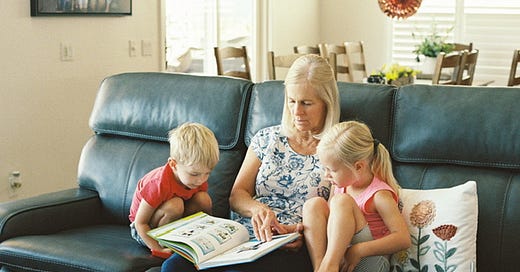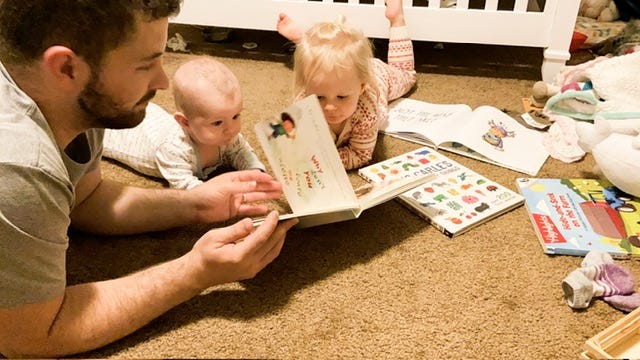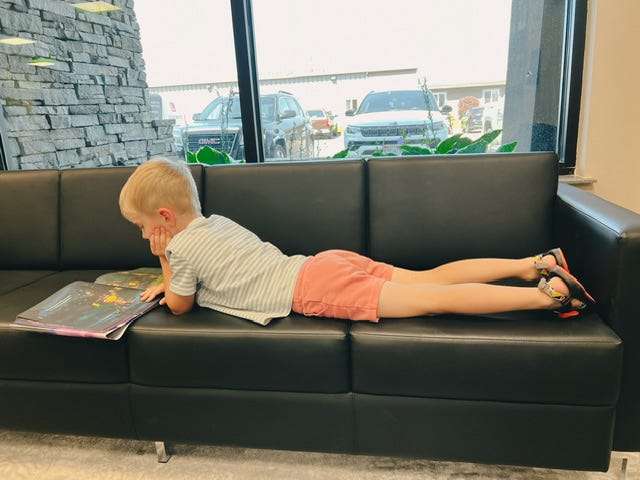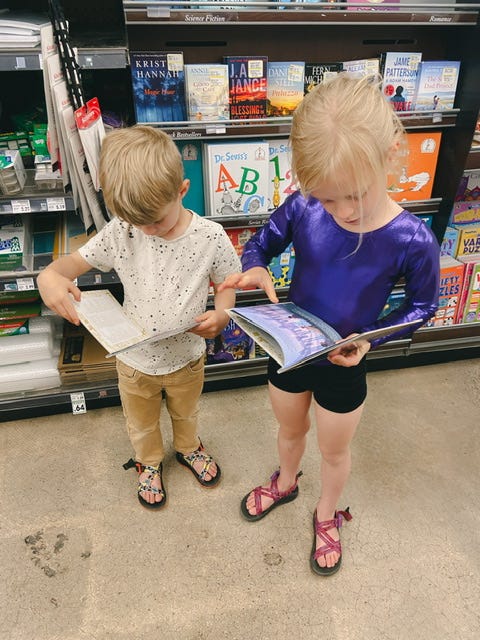The Reading Pantry: How to Read to Kids so They Don’t Hate Reading
Ch. 3—It’s easier than you think. I promise.
Welcome to the Reading Pantry! Where we peruse the metaphorical shelves of the reading world and find something to munch on for a minute.
This week we’re talking about how to read to kids! I’ve divided this into age groups so you can more easily find the tips and tricks you’re looking for.
First I must tell you, that if you’re feeling like you’re behind with reading to your kids, allow me to assure you that there is no such thing! Absolutely no such thing! You can start now or next week and you will still not be behind and coincidentally it will be the perfect time to start.
Now, I’m directing you to some sources that explain the importance of reading to your kids. This is a great, comprehensive look. A YouTube video with similar information, slightly more condensed, if you prefer that medium.
Let’s get right to it, now!
Ages 0-2
How to read with them:
Have them sit with you, on your lap or next to you. Or lay next to them on the floor!
How to read with them:
When our first kid was just a teeny tiny baby we would read her books and we started noticing that she was reacting while we were reading. She would smile or make little noises and we would watch her eyes scan the books back and forth. You may have thought that a baby isn’t impacted by you reading to them, but that assumption is wrong! They can hear you, they can see the pictures, they are there with you. Do silly voices! Make silly sounds! Point to the pictures and name things for them. As you start doing it, it will feel more intuitive. As they get closer to 18-months to 2 years you can start asking them to repeat words or point to things with you.
How often to read to them:
Every day! It can be hard to find time during the day so we tended toward reading in the morning, during a bottle, right before heading down for breakfast, or at night after everyone is all snuggly in their PJs.
What to read to them:
Anything! Board books are great because they will love to touch and grab at the pages and board books don’t tear or shred, at least for several years. Books with clear pictures. Books with rhyme or a fun poetic rhythm are great because they will hear the intonations in your voice. Here are some early favorites of ours!
Ages 2-4
How to read with them:
They will be more wiggly at this age but never fear! I have some techniques. First, always invite them to sit with you on your lap or next to you on their bed or in a cozy chair. If they don’t want to or are distracted at the moment, try the following. Read the title of the book loud enough for them to hear. Start reading in a more exaggerated form. If they’re familiar with the book read some of the first words wrong, do a silly voice or insert their name into the sentence. That usually gets their attention and they’ll come closer, sometimes slowly at first, but it usually ends up with them cozied up to you for the rest of the story. If that doesn’t work, read it anyway. Even if they’re just playing near you, they are still listening and that’s what’s important.
How to read with them:
At the tail end of this age kids will start noticing letters or familiar words and might even point them out or ask questions about them. Keep in mind that what’s most important is that you are reading to them. And naturally you may start to do what’s called story scaffolding. This is where you point things out to them or ask leading questions about the story or events that have occurred in the story. That is a great thing to do but it is not something you should stress about! if it’s making the reading less enjoyable for you or the kid, then just don’t do it. JUST READ.
You may also want to start asking them to pick books to read. Giving them the choice gives them confidence in this part of their growing up. If they pick the same book 5 days in a row, you can kindly suggest another or add to what they’ve chosen by picking one yourself. But please don’t complain about them choosing the same book over and over. We want to encourage them to read NOT tell them they’re doing it wrong.
How often to read to them:
Every day! Again, make it part of your routine. After you brush teeth, go pick a book to read!
What to read to them:
Because we’re in the wiggly phase choose books that contain things or topics that they like! Are they into frogs? Get a book about different kinds of frogs, a book with frog characters, or even a book about jungle creatures! Here is a list of some of our favorite spring books that any 2-4 year-old would love!
Ages 5-7
I only half taught my two kids to read the summer before they went to kindergarten. I used “Teach Your Child to Read in 100 Easy Lessons” book and it worked great. My only tip using that book is that you must read the directions on how to teach with that book before you start. And read them all! Don’t do like I often do and think you can just DIY it when you get to it. It is quite simple but you do need to read the instructions so you know exactly how to do it.
After that their teachers did the heavy lifting teaching them to read so what I’d like to do here is tell you how you can support early readers at home!
How to read with them:
Again, try your best to tack reading onto some of your already set routines in your house, bedtime or morning time are some of the best times to do that because you likely already have a routine for that time of day and it would be simple to add reading a book to that.
How to read with them:
Around Oct/Nov in the school year kids learn to start sounding out two and three letter words. As you are reading to them you can pause at simple 2-3 letter words and say “can you sound this word out?” or “Do you know these sounds?” Those are some great prompting questions to start with.
Try to choose words that use basic pronunciation. The following are great words to ask them to sound out or read to you while reading:
can, and, for, but, not, all, get, has, her, him, man, did, let
Think hard consonants and simple vowel sounds.
If you are skimming this letter, DO NOT SKIP THIS SECTION! PLEASE READ.
Because they are learning a new skill and a very difficult skill, they will be shy and skeptical about reading with and in front of you. The first time you ask them to sound out or read you a word they might say no. They will very likely say no. It is YOUR JOB to KEEP ASKING in kind and varied ways. Instead of saying “can you sound out this word?” try “Oh I bet you know this word!” or “I’ll read this really big word if you do the tiny one next to it?” or “I don’t remember what an ‘s’ says, do you?” Make it interesting and fun and silly and not like another chore or task that they have to do.
Now, when you finally get them to sound out a letter or a word for you, your ONLY and IMMEDIATE reaction is going to be AMAZEMENT. You are going to praise them to the ends of the earth. “What?! Wow! I didn’t know you knew how to actually read words!” or “Did you just read a whole word? How did you learn how to do that?!” or “You must be working hard at school! I can’t believe it!” It is very likely that they are already reading words like that at school, but you’re not at school so you don’t know that—or at least you’re going to pretend this is brand new—and very exciting!—information.
Now as they learn to read more complicated words it is important to point out the correct ways to read words, but you need to use the compliment sandwich technique. If they sound out the word ‘like’ with a short ‘i’ sound and they sound out the ‘e’, you simply say:
“Good job! Remember when there is an ‘e’ after this letter (point to the ‘k’) it makes the ‘i’ have a long sound and we don’t say the ‘e,’ so…and then you sound it out with them again correctly. Then after they sound it out correctly you say, “Exactly! Good job! Those kinds of words are harder, huh?” Positive, positive, positive!
Use these basic principles as your guide post for any new reading rules or words they learn. If that’s hard to remember, all you really have to remember is to be positive and praising of their efforts. Reading is DIFFICULT. And they are five! They are learning one of the most difficult skills at such a young age. It truly is a huge accomplishment.
How often to read to them:
every day! every DAY! EVERY DAY! If you miss a day, that’s fine but then get right back to it the next day! It really is so important that they are using these new skills every day.
What to read to them:
You can keep reading them all the books you have and some will be given new life since they’ll be able to read parts of them on their own. It will be fun for them to realize that they can read some of the words in their favorite books.
Pick topics they love, thanks to the money grabbing fingers of the Disney Corporations there are many books based on their popular television series which kids tend to love when they first learning to read. So if it gets them to read then go for it!
But there are so many high quality, funny and cute first reader books as well so take a little time to dig through your library shelves and find some ones you know they would love. You can also find so many of these first readers and easy readers at your local library! Look for these stickers in the top corners of the books.
Ages 7+
How to read with them:
More of the same! Set up a cozy environment, put on some chill music, have them sit with you or next to you and read away!
How to read with them:
Even though they should be reading very well on their own by now, they will still love for you to read to them so continue to do that. Read them longer or more complex stories either picture books or short chapter books if they are ready for that.
How often to read to them:
You already know—every day!
What to read to them:
Anything they like! Take them to the library and let them browse and pick out books that attract their attention. Ask your librarians for recommendations on books of a certain topic or types of characters, they are experts so use their expertise! They will likely start loving longer stories like chapter books and chapter book series. Here is a list of books my 7-year-old is loving right now to get you started!
In Conclusion…
Read to kids! Often and consistently! They like it! I promise! And it is so good for their brains, for their bond with you and a bunch of other things!
Thank you so much for the privilege of your time. Let’s meet back here in a week, OK? It’ll be podcast week and we’re going to dig in to Meghan Sussex’s new show and that’s just to start!
Talk soon,
Adri









